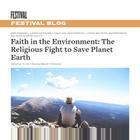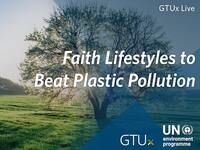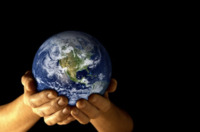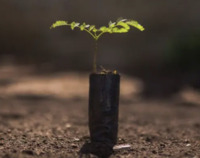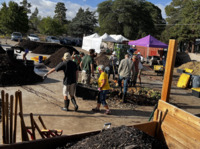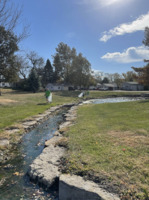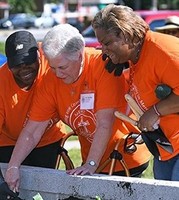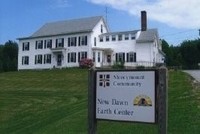Search
115 items
-
Faith in the Environment: The Religious Fight to Save Planet Earth
An article discussing the interfaith panel “Ways of Knowing, Ways of Living: Exploring Faith and Conservation” at the 2022 Smithsonian Folklife Festival. The author introduces the four panelists, their faiths, and their respective perspectives on encouraging intersections of faith and environmentalism, with Imam Saffet Abid Catovic representing Muslim faith, Jakir Manela representing Jewish faith, Michael Nephew representing Native American faiths, and Dr. Rachel Lamb representing (Evangelical) Christian faith. -
The Great Global Cleanup
This toolkit is intended to help guide people and groups on how to start and execute a cleanup project to restore communities.
"Follow our simple guide to make the most out of your cleanup. If you need any help, reach out to us at info@earthday.org." -
3000-year-old solutions to modern problems | Lyla June | TEDxKC
"In this profoundly hopeful talk, Diné musician, scholar, and cultural historian Lyla June outlines a series of timeless human success stories focusing on Native American food and land management techniques and strategies. Lyla June is an Indigenous musician, scholar and community organizer of Diné (Navajo), Tsétsêhéstâhese (Cheyenne) and European lineages. Her dynamic, multi-genre presentation style has engaged audiences across the globe towards personal, collective and ecological healing. She blends studies in Human Ecology at Stanford, graduate work in Indigenous Pedagogy, and the traditional worldview she grew up with to inform her music, perspectives and solutions. Her current doctoral research focuses on Indigenous food systems revitalization. This talk was given at a TEDx event using the TED conference format but independently organized by a local community." -
Sustainability Photo Contest
This RESTORExchange photo contest is being brought back from the pre-COVID era, and with an added collaboration with the Sustainability Institute. It's based around the question "What does sustainability look like?" This can include sustainability in environmental justice, technology, energy, lifestyle and wellbeing, society and culture, economy and politics, and any other context where you see sustainability in action. We want to see your perspectives and show all the different places that sustainability is practiced! Winning photos will be decided by a panel of judges (yet to be determined), and the top four photos will win a prize! First place will receive $400, second place will receive $300, third place will receive $200, and an honorable mention will receive $100. Submissions will be accepted through March 15, 2023. -
Faith Lifestyles to Beat Plastic Pollution
"Dr. Iyad Abumoghli and Sarah Berg, Acting Director for the Center for Climate Justice and Faith at Pacific Lutheran Theological Seminary, discuss the ways in which faith communities are uniquely positioned to combat the climate crisis.
This GTUx Lecture will specifically focus on actions that can be taken to combat plastic pollution — an area in which faith-based organizations are positioned to be significant catalyzers through educating, activating and inspiring their communities; developing capacity for sustainable practices; advocating policymakers and mobilizing the private sector; and collaborating with their community partners to advance change." -
Marianist Environmental Education Center
"The Marianist Environmental Education Center (MEEC) is an environmental education community in the Catholic tradition. In Mary's hope-filled spirit, we preserve and act in communion with the land and educate other communities in sustainability through ecology-based simple living, social justice and spirituality." -
Evolution of the Collective Unconscious
"The collective unconscious is made up of experiential knowledge, symbols, and imagery that humans are naturally born with (no tabula rasa) and are rooted in ancestral experience and shared by all persons in all cultures. After millennia of evolution, the current collective unconscious of humanity would seem to include human exceptionalism, patriarchal hegemony, short-terminism, delusions of grandeur, illusions of unending growth, and the idolatry of technology. As the planet becomes overloaded with industrial civilization, our collective mindset seems to be unwilling to think long-term and face the realities of ecological overshoot. It remains to be seen whether our collective mindset can evolve to voluntarily refocus human agency toward contraction of the human enterprise, simplification of lifestyles, and peaceful resolution of conflicts before it is too late to prevent a chaotic collapse of industrial civilization." -
Why Conservative Christians Don’t Believe in Climate Change
"American Christians have become increasingly polarized on issues of climate change and environmental regulation. In recent years, mainline Protestant denominations and the Roman Catholic Church have made explicit declarations of support for global climate action. Prominent Southern Baptists and other evangelical Protestants, on the other hand, have issued statements that are strikingly similar to the talking points of secular climate skeptics, and have attempted to stamp out 'green' efforts within their own ranks. An analysis of resolutions and campaigns by evangelicals over the past 40 years shows that anti-environmentalism within conservative Christianity stems from fears that 'stewardship' of God's creation is drifting toward
neo-pagan nature worship, and from apocalyptic beliefs about 'end times' that make it pointless to worry about global warming. As the climate crisis deepens, the moral authority of Christian leaders and organizations may play a decisive role in swaying public policy toward (or away from) action to mitigate global warming." -
Taoist monks find new role as environmentalists
This article details the efforts of Taoist leaders in China to incorporate sustainability in Taoist temples and promote a culture of environmentalism. Since 2006, the Daoist Ecological Protection Network has gained the support of 120 temples who have converted to the use of solar panels and biofuels. Taoist monks noticed many people to be ignorant towards their environmental impact, living a life of hyper-materialism. Monks wanted to help educate society about the actions that can be taken to ameliorate environmental issues both at the temples and in daily life. This pursuit is driven by a fundamental belief in Taoism to live in harmony with nature, a value that could have large impacts on society if adopted. -
Turning Around Our Relationship with Earth is a Teshuvah Project
The author recounts an unsettling encounter with a utility worker who downplayed the environmental harm of her gas leak. From here, she explains the true negative impacts of methane emissions on both people and the climate, and encourages us to act in a way that "turns around our relationship with Earth". She connects this with the Jewish tradition of Teshuvah, the time in between Rosh Hashanah and Yom Kuppur meant for repentance. -
Al-Mizan: Covenant for the Earth
"The Covenant presents an Islamic outlook on the environment in a bid to strengthen local, regional, and international actions to combat the triple planetary crises defined by the United Nations as climate change, biodiversity loss and pollution. It is a global endeavour to engage Muslims from all levels of society in the development and adoption of this call...
Al-Mizan - A Covenant for the Earth is a restatement of the principles governing the protection of nature in a form that meets current challenges. It examines the ethics behind the social patterning of human existence and enquires into how they could be brought to life today working in harmony with the heartbeat of the natural world." -
Rising: Dispatches from the New American Shore
This resource contains a series of vignettes following Elizabeth Rush as she meets people all around American who have been affected in some way by global sea rising, as well as some of her own personal experiences. She gives voice to those otherwise not heard, and shares eye opening testimonials from those who experience the effects firsthand. -
Plant With Purpose
Plant With Purpose works to restore forests by planting trees in the most devastated and vulnerable parts of the world. They do this because they view the issues of global poverty and environmental damage as interconnected. -
Living Minimally
"The image shows my crew's pitched tents on a beautiful summer day in Indian, Alaska. We were firefighters living mostly out of our tents for the summer. Conservation work and living minimally were ways I practiced sustainability in my life and connected to nature." Taken by Kelsey Wolf. Submitted to the Sustainability Photo Contest. -
Keeping Our Campus Clean
"This picture was taken on my college campus in Missouri. If you’re looking at the photo and you think you see trash bags, then you would be correct. We were doing a nature walk around campus and collecting any trash or recycling that has made its way onto campus. Our grounds team does an amazing job at keeping our campus clean but because of how close neighboring houses are, sometimes trash blows into our little creek. This creek is home to a turtle who likes to pop his head out every once in a while and startle you. There are also quite a lot of different bugs in this area that like to stay near the water!" Taken by Erin Frink. Submitted to the RESTORExchange Sustainability Photo Contest. -
Profile: Paula Penn-Nabrit (Founder of The Charles Madison Nabrit Memorial Garden)
Paula Penn-Nabrit's autobiography (from her website):
"Spiritually, I’ve been blessed as a practicing Christian, a 4th generation member of The Church of Christ of the Apostolic Faith, the same apostolic/pentecostal church my great-grandparents joined 100+ years ago.
Physically, I’m blessed as an 8th generation, native-born American of the African diaspora. I’m blessed to be a widow who was happily married for 36 years, 8 months and 22 days to an incredible man, Charles “CMadison” Nabrit. And CMadison and I were incredibly blessed by the opportunity to parent and then homeschool three fabulous sons, twins Charles and Damon who arrived in 1980, and Evan who arrived in 1982.
Academically, I’ve been blessed by my parents’ willingness to help pay for my education first at Columbus School for Girls and then Wellesley College. And I was further blessed by their willingness to help CMadison fund my quest for that terminal degree at the Moritz College of Law at The Ohio State University.
Professionally, I continue to be blessed by decades of successful operation with my consulting firm, PN&A, Inc. www.nabrit.com/pna. I started PN&A, Inc. in 1986. Next in 1990 I convinced CMadison we could stay married and work together, then in 2007 we welcomed first Damon our tech guru and later Charles as researcher and presenter into the business and finally in 2009 Evan, our youngest and a freakishly brilliant artist, agreed to manage our freelance graphics and client videos. I’m blessed to see PN&A, Inc., a black, women-owned, family-run, information-based business moving into the 2nd generation.
Intellectually, I’ve been blessed to write several books, including Morning by Morning: How We Home-Schooled Our African-American Sons to the Ivy League @2003, Random House and most recently The Power of a Virtuous Woman @2012.
Personally, I’m blessed by my extended family. In 1980 with the birth of their first grandchildren my parents began a tradition of gathering their children, their children’s spouses and their grandchildren for dinner each Sunday after church. Attendance at Grandmother and GrandDad’s Sunday dinners has grown to include nine grandchildren. We miss CMadison and Daddy, but we continue to be blessed by their memory and their legacy." -
Engaged Organizations: A Rocha International
A Rocha International discuss their mission on their website:
"At A Rocha USA, our mission is to restore both people and places through collaborative, community-based conservation.
We resource Christians to care for creation where they live by building a network of hands-on conservation projects in communities across the nation. Through partnerships with individuals, churches, and community groups, we provide content, curriculum, and a network of support for improving local habitats and increasing biodiversity." -
Engaged Organizations: Buddhist Peace Fellowship
The Buddhist Peace Fellowship discuss their purpose and mission on their website:
"Shapes movements for ecological and social justice by sharing spiritual-political practices and resources. We come together from multiple lineages, Buddhist and otherwise, to support bold, creative, loving actions to block systemic harm, while building collaborative tools and gatherings that give us the strength to be with our suffering, in order to transform towards liberation." -
Engaged Organizations: Sisters of Mercy of the Americas
Sisters of Mercy of the Americas has both sponsored and co-sponsored faith based organizations that focus on ecological issues. One of the organizations is Mercy Ecospirituality Center. -
Engaged Organizations: Mercy Ecospirituality Center
Mercy Ecospirituality Center discuss their various environmental/spiritual offerings of their retreat center on their website:
"Mercy Ecospirituality Center of Mercy Ecology, Inc. is a sponsored work of the Sisters of Mercy. We are committed to reflection, education and living gently in mutual relationship with the Earth. We offer hospitality for those seeking solace and to refresh their spirit in the beauty of creation, as well as programs in ecospirituality.
The Benedictine monks of Elmira, NY gave the 39-acre property located in the rural beauty of Vermont to the Vermont Sisters of Mercy. Sisters Judy Fortune and Elaine Deasy directed it as Lumen Christi Retreat House for many years, but after Lumen Christi closed, a group of Sisters established it as an Ecospirituality Center, originally named Mercy Farm in 2010." -
Engaged Organizations: New Dawn Earth Center
New Dawn Earth Center offers sustainability educational programs and activities for both children and adults. As indicated on their Facebook website:
"The New Dawn Earth Center invites everyone to learn from, honor and celebrate the interconnectedness of all life. We aim to create a space where humans can be in relationship with Earth and thereby nurture their own spirit." -
Shinto Faith Statement on the Environment
Shintoism belief system maintains that all earthly entities have their own spirituality and that the natural environment and people are of blood kin. The Interfaith Center for Sustainable Development posted a Shinto faith statement on the environment, prepared by the Jinja Honcho (the representative body of all Shinto Shrines in Japan) on their website. -
Daoist Faith Statement on the Environment
The Interfaith Center for Sustainable Development posted a Daoist faith statement from The China Daoist Association on the environment on their website. The following statement excerpt is shown below:
"With the deepening world environmental crisis, more and more people have come to realize that the problem of the environment not only is brought about by modern industry and technology, but also has a deep connection with people’s world outlook, with their sense of value, and with the way they structure knowledge. Some people’s ways of thinking have, in certain ways, unbalanced the harmonious relationship between human beings and nature, and overstressed the power and influence of the human will. People think that nature can be rapaciously exploited.
This philosophy is the ideological root of the current serious environmental and ecological crisis. On the one hand, it brings about high productivity; on the other hand, it brings about an exaggerated sense of one’s own importance. Confronted with the destruction of the Earth, we have to conduct a thorough self-examination on this way of thinking." -
Confucian Statement on the Environment
This Confucian statement on the environment discusses the importance of appreciating the beauty of nature. Human exploitation has disrupted this beauty, causing an imbalance in harmony among all forms of life. Interfaith Center for Sustainable Development has posted the following statement on its website:

